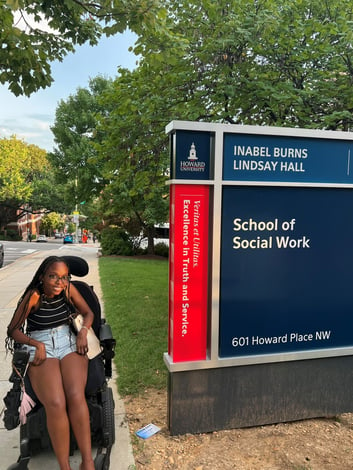Being a wheelchair user in graduate school has been both an amazing and challenging journey. When I started college as an undergraduate, I had little idea of the obstacles I would encounter. I quickly found myself in a position where I had to advocate for accommodations, especially when some professors refused to honor the ones approved by disability services. At one point, someone from disability services even suggested I had chosen the wrong major because I needed accommodations, implying I should switch to an "easier" field. In addition to facing skepticism, I had to navigate physical barriers, like inaccessible desks or school events that weren’t designed with wheelchair users in mind.

While these experiences taught me to stand up for myself and assert my needs, I was still anxious about entering graduate school. I feared a repeat of the same challenges, especially given the perception that graduate programs are more demanding and may expect students to “figure it out” on their own. I worried that professors or the institution might downplay my needs, assuming that as an adult, I should manage without additional support. While I understand the need to advocate for small adjustments—such as rearranging tables or considering class size—I didn’t want to constantly justify why accommodations and accessible spaces were essential for my success.
When I started graduate school, I was pleasantly surprised by how accepting the school and professors were. They were eager to learn about my disability, understand the importance of accessibility and accommodations, and explore how they could improve inclusivity for students with disabilities. Even my cohort showed genuine interest in learning about disability history and was mindful of how to accommodate me, especially during extracurricular activities. They also applied what they learned from me to their internships and coursework, which has been incredibly encouraging.
That said, it hasn’t always been smooth sailing. There have been moments when the school's accessibility fell short. For example, I attended a graduate school event where some of my classmates wanted to step out onto the patio to enjoy the view. There was a ramp leading to the patio door, so I followed, assuming I’d be able to roll out once the door opened. Thankfully, a classmate opened the door for me and stopped me just before I rolled out, warning me about a step between the door and the patio. I was frustrated—how could the school install a ramp to the door but fail to eliminate the step that blocked access?
On another occasion, my classmates and I were a few blocks from campus and needed to head back. It was about a ten-to-fifteen-minute walk, or seven minutes for me in my power wheelchair if I sped up (though I was being cautious, not wanting to zoom too fast while walking with them, haha!). We spotted a shuttle that was heading to campus, but when we approached, we realized it didn’t have a lift for me to board. Disappointed, we let the shuttle go without us.
These experiences have taught me that, while progress has been made, the school still has work to do in truly understanding and implementing accessibility. It’s encouraging to see professors, students, and some administrators willing to learn and be more inclusive, but there’s still a long way to go.
Learn more by accessing our Navigating and Transitioning to College with Paralysis booklet.

